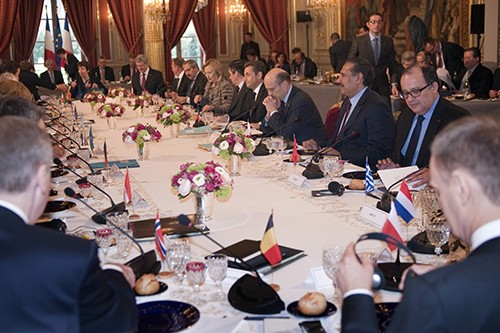WASHINGTON — French fighter jets struck targets in Libya on Saturday and the U.S. launched missile strikes on air defenses as Western powers intervened in the country’s civil war to prevent Moammar Gadhafi from crushing the rebellion in the eastern city of Benghazi.
French warplanes rushed into Libyan airspace on Saturday morning (U.S. Eastern time) while emergency talks were under way in Paris among the U.S., France, Spain, United Nations Secretary General Ban Ki-moon and the Arab League.
Al-Jazeera, the pan-Arab television network, reported that French jets destroyed a number of Libyan tanks.
The U.S. missiles were launched a few hours later. President Barack Obama made a statement announcing the action, saying the U.S. would act on the “”front end”” and then enforcement of the no-fly zone will be enforced by U.S. allies.
The leaders in Paris acted after fresh intelligence from Libya indicated that Gadhafi had thrown all his forces forward to capture Benghazi before the West could act.
In a dramatic statement, French President Nicolas Sarkozy announced the planes would prevent Gadhafi’s aircraft from bombarding the city and also attack tanks on the ground if necessary to end any assault.
The West will oppose any aggression against the civilian population in Benghazi, Sarkozy said.
At a press conference in Paris where she took part in the talks, Secretary of State Hillary Clinton said “”there will be other actions to follow”” the deployment of the French planes.
Clinton waved away questions about what those other steps might be.
Rebels in Benghazi pleaded for action Saturday reporting they were under attack from troops and tanks in the city.
Sarkozy said it appeared that the reports were true. He said Gadhafi has stepped up his military campaign after the West demanded that he stop the fighting and withdraw his forces.
Reports from cable news channel reporters on the ground in Benghazi reported that there had been a general lull in the fighting prior to the attack by the French airplanes.
British Prime Minister David Cameron announced that British planes were operating in the skies over Libya.
“”Colonel Gadhafi has made this happen. He has lied to the international community, he has promised a cease-fire, he has broken that cease-fire. He continues to brutalize his own people,”” Cameron said after the talks in Paris.
France, the U.K., the U.S. and others began the action to enforce the U.N. Security Council resolution, which is aimed at averting further bloodshed in the struggle for control of the North African nation.
In earlier, very brief, remarks during a joint appearance with Brazilian President Dilma Rousseff, Obama said the people of Libya “”must be protected”” and the West would not hesitate to act as needed.
Obama has traveled to Brazil as part of a long-planned five-day trip that includes stops in Chile and El Salvador designed to deepen economic ties with the region.
Clinton said it was “”difficult to answer”” questions about the road ahead in the showdown with Gadhafi, saying it was a “”fluid and fast-moving situation.””
Clinton said the U.S. would “”support”” its partner nation and was not leading the implementation of the no-fly zone.
Analysts said it was a sea-change for the U.S. not to be leading a military conflict that it had joined.
On Friday, Obama gave Gadhafi a “”non-negotiable ultimatum”” to immediately cease further military action against his own citizens in several cities and restore basic utility services to areas recently held by rebels.
“”Now, once more, Moammar Gadhafi has a choice,”” Obama said in a statement at the White House. “”The resolution that passed lays out very clear conditions that must be met.”” Obama said a cease-fire must be put in place immediately, and Gadhafi must let humanitarian aid reach Libyans.
The steps followed weeks of indecision and inaction by the international community, while forces seeking Gadhafi’s ouster battled his army and air forces. The fighting in Libya is the bloodiest of the unrest that has swept Arab countries in the Middle East and North Africa as populations rebel against repression, lack of opportunity and poverty.
Governments in Egypt and Tunisia have been overthrown, while protests have destabilized leaders in Bahrain, Jordan and Yemen. Unrest has also emerged in other countries in the region.
Intervention in Libya marks the most forceful action by Western powers since the regional unrest broke out.
The military action follows a 10-0 vote Friday by the 15 members of the U.N. Security Council to establish the no-fly zone over Libya.
While five members of the council, including Russia and China abstained from the vote, they declined to exercise their veto rights to block it.
Benghazi, a port city of nearly 700,000 people before the hostilities, has been at the center of an uprising that followed other pro-democracy protests across much of the Arab world. Unlike Tunisia and Egypt, whose longtime leaders were toppled by the movement, subsequent uprisings in Yemen and Bahrain have been stopped by forces loyal to their ruling families.
That’s been the case as well in Libya, where what started as street demonstrations quickly turned violent. At one point, rebel militias claimed to control most of the coastal cities east of Tripoli. But their speedy advance on the capital turned to a rout as better-trained and better-supplied troops loyal to Gadhafi mounted a devastating counter-attack.
By Friday, rebel-occupied territory had been reduced to the northeast corner of the country.
Analysts were wondering Saturday if the action from the U.N. coalition came too late to help the rebellion.









